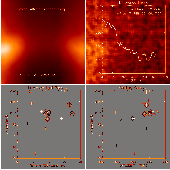
 |
Documentation > SXT Observation Notes > this page |
Image name: Straylight_Variations.png (click image to enlarge)
Image size: 186.284 KB (800x800)
Date submitted: 06-May-1995

VARIATION OF VISIBLE STRAYLIGHT
It seems that visible straylight in SXT images may not be as stable as I
had hoped, even for the same Yohkoh pointing. This is illustrated by
analysis of the terminator images listed below -- which were all
acquired at our present standard Yohkoh pointing.
These AlMg SFT images were processed through SFC_PREP and then corrected
for the orbital variation of the dark signal in the SDC images. The
latter correction, about 1% in the worst case, turned out to be
insignificant as compared to other variations.
The original motivation for this study was to reinvestigate how close to
sunset it is OK to save straylight correction images. Many in our
present SFC database were taken well below 10 seconds. I was surprised
to find, as illustrated in the lower left plot, that the extinguishing
of the straylight below 14 seconds is not well-behaved. Here the
diamonds indicate terminators taken more than 14 sec before FEM sunset.
This substantial variation in signal level is only partially due to
pointing variation which was small for these data. The variation with
pointing is illustrated in the lower right plot where, again, those
terminators taken before 14 sec are reasonably well-behaved and show a
conistent variation over the half arcminute of pointing drift.
However, even for the 2 images taken on the same day and more than 20
sec prior to sunset, indicated by the asterisks, there is a difference
of nearly 4 percent in straylight signal. The difference image of these
2 terminators, shown in the upper right, displays a definite pattern --
a pronounced gradation from east to west. I have not yet checked the
statistics rigorously but believe that the difference in signal level
seen between these 2 images is more than 30 sigma.
The only cause that I can think of to explain this variation is a change
in the property of the hole in the entrance filters. If the torn
filters move and obscure or uncover more aperture then this could cause
such a variation.
The much greater variation near sunset may have something to do with the
shape of the straylight image. Sunset in space produces bright colored
bands of refracted light along the horizon. The properties and
brightness of these sunset effects are affected by clouds and perhaps
other things. Even though the intensity is less than the direct sun the
angular spread could conceivably cause these large variations in total
straylight near sunset.
Data:
0 29-JAN-95 21:18:53 QT/H Open /AlMg Half Norm C 25 5338.0 512x512
1 31-JAN-95 12:12:38 QT/H Open /AlMg Half Norm C 25 5338.0 512x512
2 31-JAN-95 17:04:22 QT/H Open /AlMg Half Norm C 25 5338.0 512x512
3 1-FEB-95 07:39:34 QT/H Open /AlMg Half Norm C 25 5338.0 512x512
4 6-FEB-95 05:59:01 QT/H Open /AlMg Half Norm C 25 5338.0 512x512
5 7-FEB-95 04:40:53 QT/H Open /AlMg Half Norm C 25 5338.0 512x512
6 7-FEB-95 06:17:57 QT/H Open /AlMg Half Norm C 25 5338.0 512x512
7 7-FEB-95 12:47:17 QT/H Open /AlMg Half Norm C 25 5338.0 512x512
8 7-FEB-95 20:53:41 QT/H Open /AlMg Half Norm C 25 5338.0 512x512
9 7-FEB-95 22:30:45 QT/H Open /AlMg Half Norm C 25 5338.0 512x512
10 8-FEB-95 05:00:05 QT/H Open /AlMg Half Norm C 25 5338.0 512x512
11 15-FEB-95 02:25:04 QT/H Open /AlMg Half Norm C 25 5338.0 512x512
12 16-FEB-95 02:44:21 QT/H Open /AlMg Half Norm C 25 5338.0 512x512
13 31-MAR-95 03:10:23 QT/H Open /AlMg Half Norm C 25 5338.0 512x512
14 4-APR-95 01:11:30 QT/H Open /AlMg Half Norm C 25 5338.0 512x512
15 5-APR-95 06:22:14 QT/H Open /AlMg Half Norm C 25 5338.0 512x512
16 7-APR-95 02:08:16 QT/H Open /AlMg Half Norm C 25 5338.0 512x512
17 13-APR-95 02:23:20 QT/H Open /AlMg Half Norm C 25 5338.0 512x512
L. Acton
6-May-95